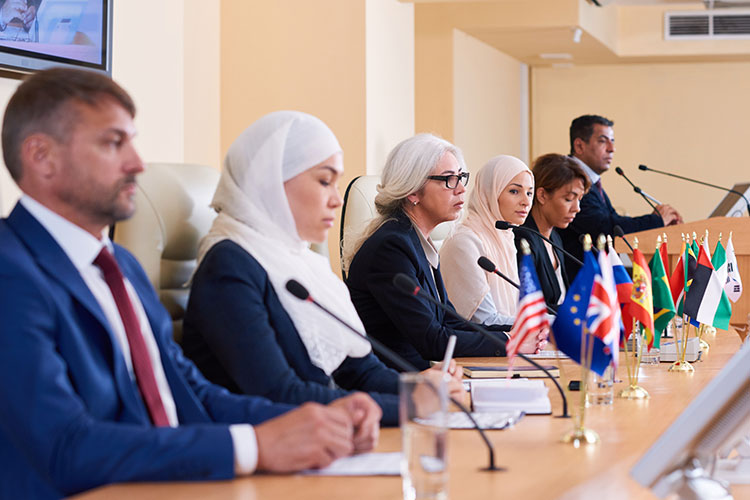Author Recent Posts Linta Jamil Latest posts by Linta Jamil (see all) Water Scarcity, Land Degradation, Climate Change: A Disaster for Pakistan’s Food Security – April 22, 2025 International Refugee law and Repatriation of Afghan Refugees – April 22, 2025 China’s Response to Trump’s Tariff War – April 22, 2025
Structural changes are necessary for the foreign policy of Pakistan to achieve its objectives to the fullest. Over the years we have seen that this policy is not delivering the desired outcomes. For it to deliver results, the policy needs to be revamped in both diplomatic and economic fronts while keeping globalization under consideration. Policy-makers also need to ensure a greater intellectual input and influx of ideas while revamping the foreign policy.
Pakistan faced jolts of poverty, extremism, border tensions amongst other challenges soon after it came into being. Hence the foreign policy of this novice state kept changing its direction adjusting itself to newer strategies against new battles. In its initial phase the policy worked in all dimensions that would help this state successfully mark its position on the world map. This included countering Indian aggression against events such as the 1965 war and acquiring US Aid by entering alliances such as SEATO, CENTO of the 1950s.The policy worked to rebalance this country’s interest after receiving the blow of East Pakistan’s separation into what is now Bangladesh. From 1971-1989 Pakistan was again involved into the Soviet Intervention in Afghanistan. Then in the late 1990s came strong economic sanctions against Pakistan by the US over nuclear tests. To some relief, post 9/11 these sanctions were lifted but America’s nomination of Pakistan as its most-allied ally directly plunged Pakistan into the menace of having to fight terrorism.
Then came the December 2001 attacks on the Indian Parliament which tarnished Indo-Pak relations bringing the escalation towards a direct border confrontation. Our foreign policy worked well here bringing these tensions towards the 2003 ceasefire on the line of control. Furthermore, there was a diversification of Pakistan’s foreign policy under the PPP from 2008-2013.Kerry-Luger Bill was signed in October 2009 where $7.5 billion was to be granted to Pakistan by the US in non-military aid. Also, the-then leadership made several high-profile visits to Moscow.
Following 2013, entering SCO (Shanghai Cooperation Organization) consolidated China, Russia and Central Asian Republic’s support to combat extremism. Pakistan also entered CPEC, the flagship project of BRI (Belt and Road Initiative). This welcomed immediate cash into the country as new infrastructure started developing with Chinese support. Suki Kinari hydropower project was launched with full success welcoming new jobs. Till now over 236,000 jobs have been generated under CPEC. Suki Kinari plant in the Mansehra district entered its first wet testing phase on the 16th of June 2024.It is to effectively meet 20% of Pakistan’s electricity deficit.
This foreign policy however, needs a revamping of structure. The following shortcomings of the current policy are to be observed and scrutinized while setting new priorities. This policy has to be strategic rather than economy centric like it is today. The policy is seen to be taken over by the establishment, rather Pakistan’s foreign policy needs more intellectualism and a free flow of ideas by policy makers and the public in general via designated forums such as think tanks.
The foreign policy also needs a shift towards globalization as a key factor in determining its future contours. Pakistan needs to consolidate its economic cooperation with international community under the banner of a global economy and safeguard the interests of Pakistani diaspora around the globe.
There also needs to be a shift away from religion centric policies. Inspiration can be drawn from Muslim countries like Turkey and UAE which are known to have a successful foreign policy. For example, within a year after Israel declared independence, Turkey recognized its sovereignty.
Fourthly, our foreign policy is overshadowed by our economic interests almost since we came into being as a state. There are numerous instances of leadership seeking the assistance of richer nations with a begging bowl. Our foreign policy should rather be standing on Pakistan’s strategic interests. Also, Pakistan’s fiscal interests need to be in the light of a global economy where reliance should largely be placed on Pakistani exports rather than on foreign aid.
CPEC is a golden opportunity to improve our domestic economy and reduce dependence on foreign aid. However, Pakistan seemingly lacked the capacity to reap full benefits of it. At the time of its signing strategists foresaw a relocation of Chinese Industry in Pakistan. Neither this goal has been met nor do we see this happening in the near future. It must be noted here that if the long-term objectives of this economic corridor are not met then we already see a staggering $110 billion in foreign loans.
In summary, this foreign policy needs intellectual input and a free-flow of ideas for it to be restructured effectively. As mentioned above, our foreign policy needs to be strategic rather than placing it at the pivot of Pakistan’s economy. And even when this is done it must be ensured that dependence is sought from domestic economy rather than on foreign assistance. When this happens, this policy will keep changing with the changing geo-political conditions and economics domestically, and around the globe. Kissinger called successful diplomacy as the one which bridges the gap between society’s experiences and its aspirations. Globalization also needs to be a prime consideration of this subject.
- Water Scarcity, Land Degradation, Climate Change: A Disaster for Pakistan’s Food Security - April 22, 2025
- International Refugee law and Repatriation of Afghan Refugees - April 22, 2025
- China’s Response to Trump’s Tariff War - April 22, 2025





















Leave a Comment
Your email address will not be published. Required fields are marked with *